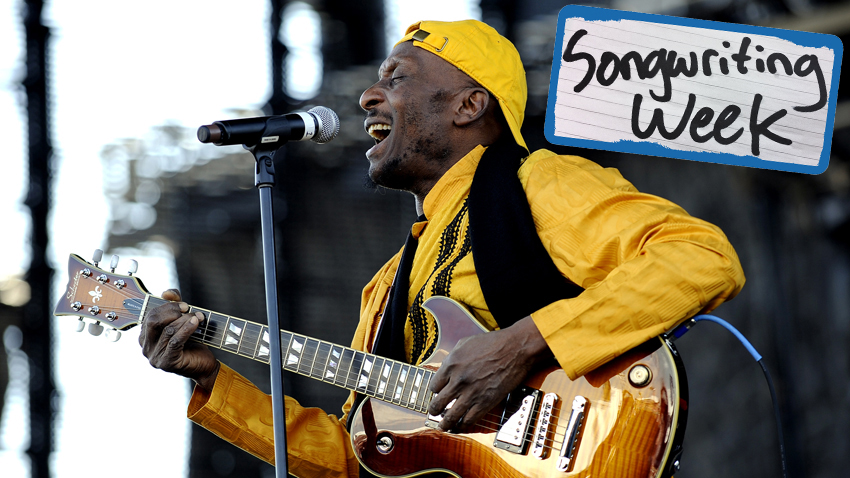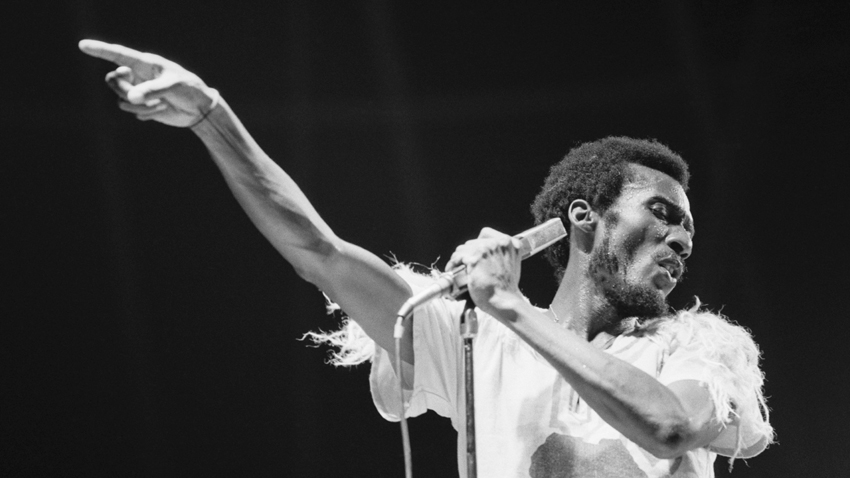Jimmy Cliff on a life in songwriting
Jamaican legend on inspiration and message

SONGWRITING WEEK: Jamaican songwriting sensei Jimmy Cliff seems to have been put on this earth purely to produce brilliant music. Most great musicians have a gift - a great voice, a natural charisma, a knack for penning a melody - Jimmy Cliff has all three.
Best known for self-penned jaw-droppers Many Rivers To Cross, Wonderful World Beautiful People and Hard Road To Travel - songs that would help define the sound of 70s ska and reggae - Jimmy's initial breakthrough came when he was just 14, with Hurricane Hattie, a song written entirely in his head. Now 65 and 30 albums in, he released the Tim Armstrong-produced Rebirth last year to much acclaim and is already working on a follow-up.
Cliff spoke to us about writing his first tunes from memory, where he finds inspiration and the importance of a song's message...
What are the three most important songs in your career?
"For my new album, which I'm currently putting together, there's a song called Bridges. It's an important song, because first of all it's a big summary of my life; secondly, it's an inspirational song of where we are today as humanity. So I consider this one of the most important songs that I've written. It's about the great imbalance in the world, in every aspect - economically, socially, spiritually. What is lacking, and it sounds like a cliche, is really divine love."
What are you most proud of in the past?
"Of course, Many Rivers To Cross, it still is a very important song in my life. Again, it relates to my life and it relates to humanity. Then maybe something from the last album Rebirth… Children's Bread is really the deep things that I feel about the injustice that I see going on in the world. Then One More, which is a little more personal, so it's a toss up between those two."
Get the MusicRadar Newsletter
Want all the hottest music and gear news, reviews, deals, features and more, direct to your inbox? Sign up here.
It's interesting that your choices are songs that seem to have both a personal and universal appeal.
"Absolutely. Of course, our lives individually, it's most important, but we don't exist alone. We interact with everything! So when one realises this, this is so important. Some people just live, they don't have to care, they just live, but some people have it inside of them that they have to care. I'm one of those people."
Is that why your songs always have a message?
"Oh yes. A message is very important. But I think the message that I put there is the message about upliftment, appreciation for our lives and inspiration to live, because the negativity and the positivity in life is a difficult thing to balance. That is something I have learnt and I try to share that with the people, with the world."

Jimmy Cliff performing in 1982 (Credit: John Van Hasselt/Sygma/Corbis)
Which comes first? The music or the message?
"There's not a definite pattern. If, for instance, I'm walking in Notting Hill Gate and I see something that touches me deep: boom! It's an idea! Boom! Maybe a melody comes! Boom! A title! So they come in different ways. Sometimes I sit down and I say, 'I want to write a song' and I don't have anything in my head. I don't always necessarily write with an instrument, sometimes they just come to me like that, or sometimes I'll pick up a piano, or a guitar, or my bongo drums and a rhythm comes. It's so varied."
How do you go about documenting those ideas?
"In the very early time, I never wrote anything down! Not even words! As time goes on I find that I can't retain everything, so I started jotting down words, and as that goes on I find that, 'Wow. I need to record some kind of melody, or I'm going to forget it!' So I do both now. I'm thankful for the technology that we have today. I can just pull out my phone and put it down."
You said you used to remember your songs. Did you write in your head then? Did you use instruments?
"No instruments at all for my first two or three albums. The song just comes, maybe I'd lay on my back - I love laying down on my back! - and I'd just let the whole thing come to me, then once I got up, I'd got it. Then later on in my life, I found that if I got a little piece of it, I'd try my best to retain it and then when I'd go to my village in Somerton, which is very tranquil, to the family home. We had a piano and a guitar there and I'd put everything together."

Jimmy connects with the muse live (credit: Michael Hurcomb/Corbis)
You've been writing songs since you were very young. Has the way you approach it changed?
"Not a lot. I just kind of expanded. When I wrote songs in school, I'd just write about feelings and ideas. [Laughs] One of my first songs - I still remember it, and I didn't record it up until now - was called I Need A Fiancee! I came upon this word 'fiancee'. [Laughs] I didn't even know the meaning very much, but I thought 'Oh!' and wrote a song about that… The expansion that I've made is that the love has become more universal, rather than just one-to-one love. For example, Wonderful World, Beautiful People is about universal love. Those are my 'expansions'."
Can you remember the first song you wrote that you couldn't wait to share with people?
"Ah. That is a great feeling! Because you know you got it! The kind when you have a little bit of fear, because you don't want to scare it [off]. It's so very positive. It was Hurricane Hattie. It was a big storm in Belize that destroyed the place, so I wrote a song about that, but I related it to love again. And, wow, I couldn't wait when it was completed. I ran down the street to the little barber shop that I used to hang out at and was like, 'Hey! I got a song! Listen to this!' I was so excited - and when I get excited, I just know I got it."
How important is collaboration?
"Very important, because then there is somebody to bounce-off and become inspired. When I covered Cat Stevens' - as he was called then - song Wide World. I heard it in the publisher's office and I said, 'I like that song.' He said, 'Oh, you like it? Steve wrote it, but he doesn't like it.' I was quite inspired by it and then when we collaborated in the production, I bounced off him, because he is a very sensitive person. He was quite spiritual, not about religion, just natural spirituality, and I tapped into that and I think vice versa."
What's the most important lesson you've learned about songwriting?
"It's all about inspiration. Different things, different people, different places inspire artists. It's all about that. You have to be an open receptor."
For more information, including details on upcoming US tour dates, visit the official Jimmy Cliff website.
Matt is a freelance journalist who has spent the last decade interviewing musicians for the likes of Total Guitar, Guitarist, Guitar World, MusicRadar, NME.com, DJ Mag and Electronic Sound. In 2020, he launched CreativeMoney.co.uk, which aims to share the ideas that make creative lifestyles more sustainable. He plays guitar, but should not be allowed near your delay pedals.










